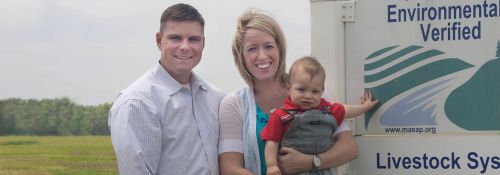
Life in the Farm Lane: Talking Dairy with Ali Ferry
From Litchfield Road, a short drive north of Hillsdale College, the view of Ferry Farms is idyllic. Old and new barns sit upon a hill, surrounded by dandelion-filled grasses and fields. The clip-clop of horses pulling an Amish buggy down the road cuts through the air, while cows bellow with their deep “moos.” But a drive up the hill and back to the barns reveals a flurry of activity on this dairy farm, now in its 110th year of operation. Alissa “Ali” Hoard Ferry, ’07, and her husband Scott left the frenzy of urban life behind when they moved here seven years ago, but as full-time farmers, they lead a life no less busy in an industry that demands round-the-clock attention.
Ali, who graduated with a degree in accounting, and Scott, who received a degree in finance from Michigan State University, began their careers in metro Detroit. When Scott’s father passed away suddenly in 2008, they faced a big decision: should they leave the security of their careers to take over the operation of the family farm in Litchfield? “We deliberated for eight months,” recalls Ali. “Ultimately, we decided we would rather raise a family on a farm than in the city.”
In June 2009, the Ferrys took ownership of Ferry Farms, becoming the fourth generation to run the farm. No sooner had they started to get into their new routine than calamity struck. In October 2009, a fire destroyed several buildings on the property. But with that loss came the opportunity for growth and improvement. They built a new commodity barn and shop barn, and in 2011, they built a free stall barn, in which cows can move freely, eating and resting when and where they want. The barn has the capacity for 280 cows and stays at a comfortable 67 degrees year-round. They also implemented practices, such as crop rotation and manure testing, to improve conservation and reduce pollution. The Michigan Agriculture Environment Assurance Program has certified the farm for its environmentally friendly practices.
Each workday begins at 3:00 a.m. The first of nine full-time workers arrives to feed the cows. “The average dairy cow eats 100 pounds of feed and drinks 30 gallons of water a day,” Ali says. The Ferrys grow their own food for the cows, farming 1,500 acres of corn, soybeans, alfalfa, and wheat. A nutritionist also comes in once a week to change feed rations.
At 4:00 a.m., the first milking shift begins. “We milk the cows three times a day,” Ali says. While the Ferrys own more than 700 cows, they currently milk about 330. The milk is shipped out daily and processed by the Michigan Milk Producers Association. From there, the milk appears in many familiar stores and products. “The milk is sold at Kroger, and it is also used for butter at McDonald’s, cheese at Domino’s Pizza, and even exported in powder form to China,” Ali says.
As a farmer, Ali likes to debunk misconceptions about the origins of food. “My pet peeve is when people think that food originates at the grocery store,” she says. To that end, she has been active in agricultural education programs, especially for children. She gives a presentation each year for Project RED (Rural Education Day), in which Michigan fourth-grade students attend a program in their respective counties to learn about where food comes from and what farmers do. She has also given “Ag in the Classroom” presentations at local schools. In 2013, she and Scott hosted 3,000 people for Breakfast on the Farm, a program sponsored by the Michigan State University Extension in which citizens can learn about modern food production firsthand from farmers. For their contributions to agriculture, they were selected as one of four winners of the 2014 National Young Farmers Award. With this honor came the opportunity to travel to Washington, D.C., last year and meet with legislators during National Ag Week.
Ali still puts her accounting degree to good use. “My degree has been invaluable in running the farm and making marketing decisions,” she says. “If I had to do it again, I would absolutely major in accounting.” She also provides accounting services for two local businesses on a contract basis, which allows her to work from home. This gives her the flexibility to work whenever and wherever help is needed on the farm, while also caring for four-year-old Amelia and two-year-old Griffin. The family will welcome a third child this fall.
While farm life doesn’t end at 5:00 p.m. or take weekends or holidays off, it offers the Ferrys immense satisfaction. “We plant the seeds, raise and harvest the crops, feed the cows, and drink the milk they provide,” Ali says. “It’s so rewarding to know we are providing food to people, and to know where that food comes from.”
Printed in the Spring 2016 Alumni Magazine